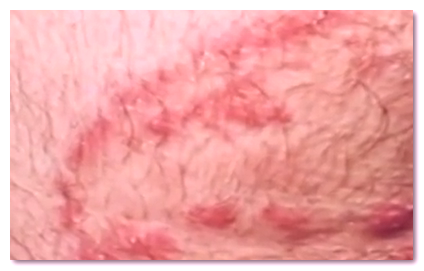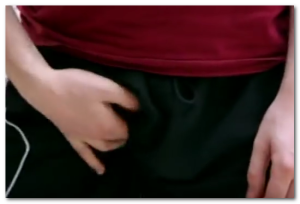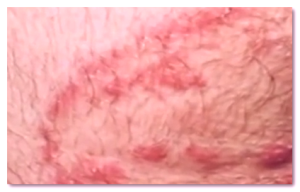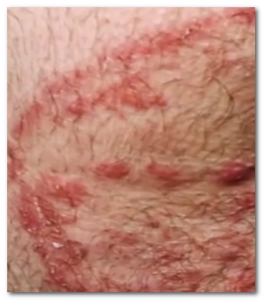Jock itch is also known as tinea cruris. It is a common fungal infection which affects the area of your inner thigh, buttocks and genitals. This infection results in usually ring shaped itchy red areas, which occur in such moist areas of your body. It is called jock itch because of its characteristic of appearing more frequently in the individuals who sweat a lot, such as athletes or obese people. It makes the affected person uncomfortable but does not possess any hazardous side effects.
Causes
This condition is caused by a fungus, ringworm. Ringworm is not a worm, but is a fungus affecting the upper layers of the skin and nails. Fungi grow best in warm and moist atmospheres and multiply rapidly. As suggested by the name, jock itch is more common in athletes but can occur in anyone. Frequent use of public showers and toilets can also predispose you to develop this infection. A person can get affected by jock itch and athlete’s foot at the same time also, as both are caused by fungus. It is more common in males because of the anatomic structure of their groin and genital region. The promoting factors are tight undergarments, skin friction, excess sweat and overgrowth of bacteria.
Symptoms of jock itch
The symptoms may appear and disappear periodically. Normally, the condition resolves by itself without opting for any specific treatment. The common symptoms of the condition include:
- Pain and itching of the affected area, i.e. the groin, buttocks and genitals, with an offensive smell.
- A red rash on the skin of affected area. The rash usually has raised margins and gives the appearance of a blister. The centre of the rash may give a reddish brown appearance.
- The rash may show bumps or scaly skin.
- The bumps can sometimes get filled with pus or may ooze.
- In severe untreated cases, it may progress to develop an open sore, ulcer or break in the epithelium.
- Women may develop vaginal discharge and men can develop infection in the head of the penis. This condition is more common in the uncircumcised penis.
Predisposition
This condition can occur to anyone, but is more common in people with some specific habits or body structure. The people who have a greater tendency of developing jock itch include:
- Patient suffering from any other disease which compromises the immune system of the patient, like AIDS or diabetes.
- Patient undergoing systemic chemotherapy or is on immunosuppressive drugs.
- Patient having any other fungal infection in the body.
Prevention
You can prevent getting jock itch by taking care of your body. Make sure to take a bath and clean your inner thighs and buttocks region using a mild soap after every sweating session. After cleaning the area properly, apply some powder to it, to prevent moisture and sweat. Use light and non-occlusive fabric in your undergarments.
Diagnosis
The doctor can diagnose the condition on the basis of the clinical features of your rash and the associated symptoms. Sometimes, biopsy may be required to confirm the diagnosis. In some other cases, skin swabs are taken and are examined in pathology for the diagnosis. Such an examination rules out the other possibilities and helps in establishing a confirm diagnosis. A bacterial culture is helpful in differentiating it from any other bacterial infection.
Differential diagnosis
Some other conditions which may appear somewhat similar to jock itch include dry skin, heat rash, impetigo, eczema, contact dermatitis or inverse psoriasis. A pathological examination of the skin of the area will rule out the other possible conditions in cases of any doubts.
Is Jock Itch Contagious?
This is not communicable in some of the cases, but may spread by sharing swimwear or towels, or having sexual relationship with the affected individual. It can spread by any close skin contact with the affected individual. The spread of this infection is also highly dependent on other conditions of the individual such as the health status, obesity, immune system capacity and moist areas of the skin. If a person is already having athlete’s foot, he has a greater chance of developing jock itch.
Treatment
It is very easy to treat jock itch and rarely in chronically untreated cases, it may advance to develop a sore or ulcer. It can also resolve by itself in some cases and does not require treatment. Specific treatment includes cleaning and hygiene maintenance of the groin area and application of topical antifungal powders. Zinc oxide ointments can also be used.
Complications
Usually jock itch is a self limiting condition and does not advance to create any complication. But, in a few cases, it may worsen to form an abscess or can cause cellulitis. It may also cause some temporary skin discolorations in the region which may include both hyperpigmentation and hypopigmentation. This discoloration is usually temporary, and is caused after the correction of the infection.
Jock itch pictures
Why does the jock itch smell?
The groin has apocrine glands that are known to secrete liberal amounts of sweat Sweat by itself has no odor. But when the bacteria in the region get mixed with sweat in the groin, it emits foul odor. That is why the itchy sensation is coupled with bad smell, as well.
How to remove or reduce jock itch smell?
- Drink plenty of water, this is quite effective in flushing out the toxins in the body.
- Put some baking soda on a clean cloth and cover the jock area with this cloth. The baking soda is quite effective in absorbing the bad odor.
- Tea tree oil has antifungal qualities and is quite effective in helping you get rid of the jock itch, including the odor. You can put few drops of tea tree oil to the bathwater. Alternatively, take a cotton ball, dip it in tea-tree oil and apply it to the affected area twice a day. You can even mix five drops of tea tree oil with some coconut oil, if you feel a burning sensation while application.
- Wheat grass is ideal to remove the body odor, internally. Drink 500 mg of wheat grass juice the first thing in the morning.
- Put 3 tablespoons of white vinegar in a little glass of water, take a cotton ball or sponge and wipe the jock area with the solution. This will reduce the offensive odor to a large extent. There may be the typical characteristic smell of vinegar, which will also disappear in due time.



